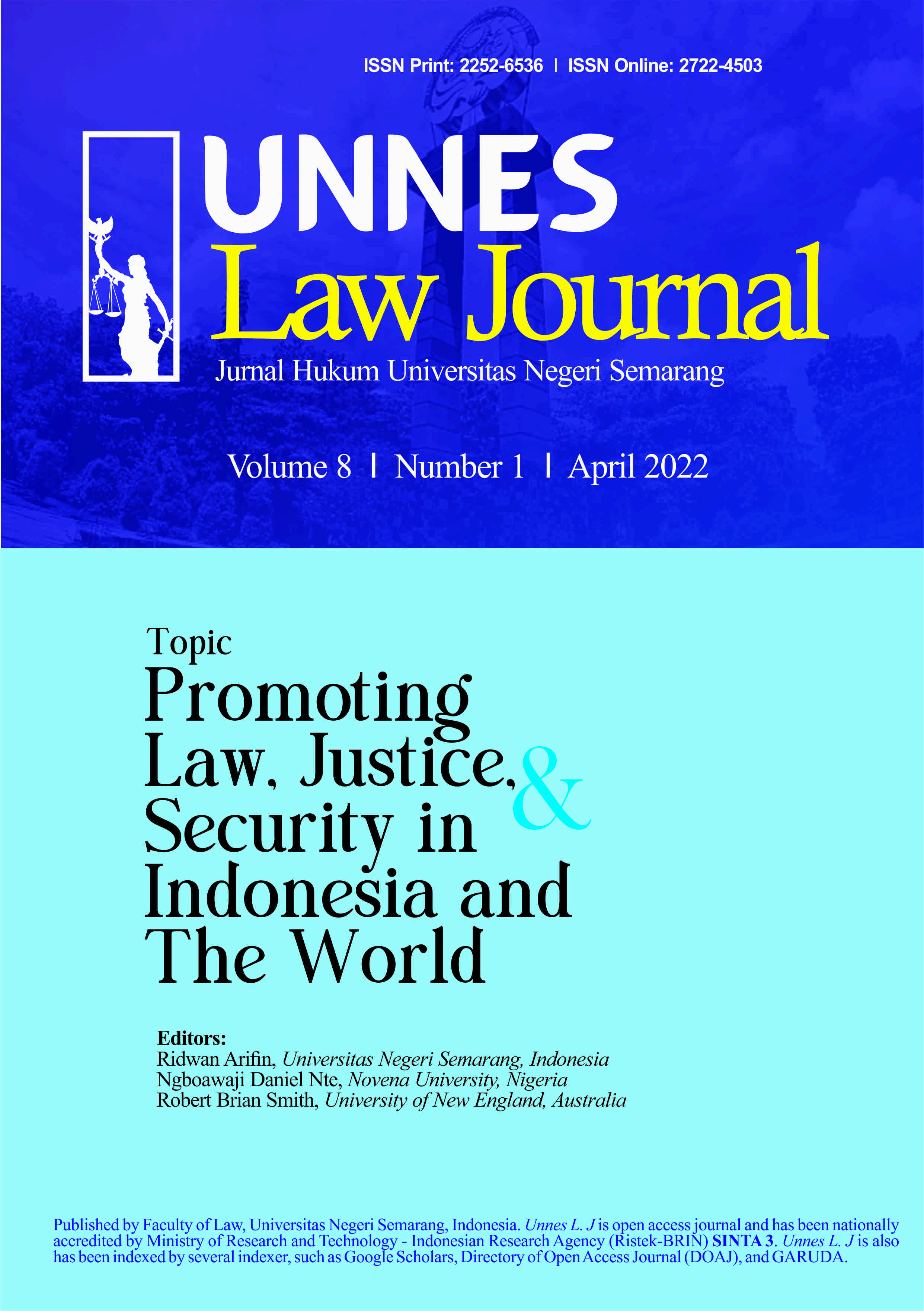Forestry Sector Corruption and Oligarchy: A Case Study of the Laman Kinipan Indigenous People, Central Kalimantan Anti-Corruption Law, Forestry Law, Law and Policy
Main Article Content
Abstract
Corruption is a serious problem in the rule of law development and sustainable development efforts. Law enforcement for weak environmental destroyers. On the other hand, the corruption process that is conducted involves a very strong power network and has impunity. This paper used a socio-legal based legal research method. Corruption in the forestry sector in Indonesia not only harms the state financially, but also creates environmental degradation that has an impact on human rights violations for the Laman Kinipan indigenous people. The Laman Kinipan indigenous people as victims of environmental damage have the right to get a solution from the perspective of being victims of environmental damage, both in the context of criminology, access to responsibility and accountability for environmental damage, then the impact of community sociology recovery, ensuring for perpetrators of environmental damage receive appropriate sanctions, as well as recovery in a collective sense. An effective anti-corruption mechanism with programs and compliance intended for business people and the government in preventing bribery corruption in the licensing sector, especially for PT.SML and the concession management circle at Laman Kinipan. Strengthening the concept of strict liability is a very strategic option in this era of industrialization to prevent environmental damage from corruption in the forestry sector.
Article Details
References
Asshiddiqie, Jimly. Konsolidasi Naskah UUD 1945. (Jakarta, Yarsif Watampone, 2003).
Baker, Jacqui. “Jaringan Korupsi di Sektor Kehutanan Indonesia: Politik dan Pulp di Pelalawan, Riau.” U4 Anti-Corruption Resources Center 13 (2020): 1–36. https://www.u4.no/publications/jaringan-korupsi-di-sektor-kehutanan-indonesia
Brodowski, Dominik, M. De De Espinoza Los Monteros La Parra, Klaus Tiedemann, and Joachim Vogel. Regulating Corporate Criminal Liability. Regulating Corporate Criminal Liability. (Switzerland, Springer Nature, 2014). https://doi.org/10.1007/978-3-319-05993-8.
Cronin, Bruce. “Response to Sebastian Kaempf’s Review of Bugsplat: The Politics of Collateral Damage in Western Armed Conflicts.” Perspectives on Politics 17, No. 2 (2019): 538-539. https://doi.org/10.1017/s1537592719001270.
Diarra, Gaoussou, and Sébastien Marchand. “Does Pervasive Corruption Matter For Firm’s Demand for Good Governance in Developing Countries?”. HLS Human and Social Sciences (2011). https://halshs.archives-ouvertes.fr/halshs-00588191
Duncan, Christopher R. “Mixed Outcomes: The Impact of Regional Autonomy and Decentralization on Indigenous Ethnic Minorities in Indonesia.” Development and Change 38, No. 4 (2007): 711-733. https://doi.org/10.1111/j.1467-7660.2007.00430.x.
Faure, Michael, and Andri Wibisana. Regulating Disasters, Climate Change and Environmental Harm: Lessons from the Indonesian Experience. Regulating Disasters, Climate Change and Environmental Harm: Lessons from the Indonesian Experience. (Cheltenham Glos UK, Edward Elgar Publishing Ltd., 2013. https://doi.org/10.4337/9781781002490.
Forestdigest.com. “Ekosida: Kejahatan Lingkungan Yang Belum Diakui.” Forest Digest. 2019.
FWI. “The State of the Forest: Indonesia.” Indonesia Bogor Indonesia Forest Watch Indonesia and Washington DC Global Forest Watch 10, no. March 9th (2002).
Hall, Matthew. Victims of Environmental Harm: Rights, Recognition and Redress under National and Intemational Law. (London, Routledge, 2013). https://doi.org/10.4324/9780203083444.
Joshi, Laxman, Wijaya Kusuma, Sirait Martua, and Mulyoutami Elok. “Indigenous System and Ecological Knowledge among Dayak People Ini Kutai Barat, East Kalimantan: a Preliminary Report.” ICRAF Southeast Asia Working Paper, No. 2004 (2004): 1–22.
Kartodihardjo, Hariadi, Niken Ariati, and Maryati Abdullah. “Kebijakan Pencegahan Korupsi Sektor Sumber Daya Alam Melalui Pendekatan Institusional dan Struktural.” Jurnal INTEGRITAS 5, No. 2-2 (2020): 33-47. https://doi.org/10.32697/integritas.v5i2-2.481
LBH Palangkaraya. Pembelajaran Advokasi Kasus Kinipan. (Palangkaraya, LBH Palangkaraya, 2020).
Leichenko, Robin, and Karen O’Brien. Environmental Change and Globalization: Double Exposures. (Oxford, Oxford University Press, 2008). https://doi.org/10.1093/acprof:oso/9780195177329.001.0001.
Navas, Grettel, Sara Mingorria, and Bernardo Aguilar-González. “Violence in Environmental Conflicts: The Need for a Multidimensional Approach.” Sustainability Science 13, No. 3 (2018): 649–660. https://doi.org/10.1007/s11625-018-0551-8.
Nyberg, Daniel, and Christopher Wright. “Justifying Business Responses to Climate Change: Discursive Strategies of Similarity and Difference.” Environment and Planning A 44, No. 8 (2012): 1819–1835. https://doi.org/10.1068/a44565.
Obidzinski, K., A. Andrianto, and C. Wijaya. “Cross-Border Timber Trade in Indonesia: Critical or Overstated Problem? Forest Governance Lessons from Kalimantan.” International Forestry Review 9, No. 1 (2007): 526-535. https://doi.org/10.1505/ifor.9.1.526.
Prakasa, Satria Unggul Wicaksana. “Merdeka dari Asap.” Harianbhirawa, 2019.
Prakasa, Satria Unggul Wicaksana. “Perdagangan Internasional Dan HAM: Relasinya dengan Sustainable Development.” Jurnal Hukum Novelty 9, No. 1 (2018): 36-53. https://doi.org/10.26555/novelty.v9i1.a9224.
Sands, Philippe. Principles of International Environmental Law. 2nd ed. (Cambridge, Cambridge University Press, 2003). https://doi.org/10.1017/CBO9780511813511.
South, Nigel. “Green Criminology: Reflections, Connections, Horizons.” International Journal for Crime, Justice and Social Democracy 3, No. 2 (2014): 5-20. https://doi.org/10.5204/ijcjsd.v3i2.172.
Spapens, Toine, Rob White, and Marieke Kluin. Environmental Crime and Its Victims: Perspectives within Green Criminology. (London, Routledge, 2016). https://doi.org/10.4324/9781315580005.
Steady, Filomina Chioma, ed. Environmental Justice in the New Millennium: Global Perspectives on Race, Ethnicity, and Human Rights. (London, Palgrave Macmillan, 2009). https://doi.org/10.1057/9780230622531.
Tamanaha, Brian Z. Realistic Socio-Legal Theory : Pragmatism and a Social Theory of Law. (Oxford, Clarendon Press, 1997).
Tempo.co. “Kayu Besi Riwayatmu Kini,” 2020.
Ucar, Erdem, and Arsenio Staer. “Local Corruption and Corporate Social Responsibility.” Journal of Business Research 116 (2020). https://doi.org/10.1016/j.jbusres.2020.05.012.
Wicaksana Prakasa, Satria Unggul. “Anti-Corruption Survivor, Academic Freedom, And The Challenges.” Petita: Jurnal Kajian Ilmu Hukum Dan Syariah 4, No. 2 (2019). https://doi.org/10.22373/petita.v4i2.22.
Williams, C. Environmental Victims: New Risks, New Injustice. (Earthscan Publications, 1998).
Winters, Jeffrey A. Oligarchy. (Cambridge University Press, 2011). https://doi.org/10.1017/CBO9780511793806.
Wiratraman, H. P., & Putro, W. D. “Tantangan Metode Penelitian Interdisipliner Dalam Pendidikan Hukum Indonesia.” Jurnal Mimbar Hukum, 31, No. 3 (2019): 403–15.
Wright, Glen. “Indigenous People And Customary Land Ownership Under Domestic Redd+ Frameworks: A Case Study of Indonesia.” Law, Environment and Development Journal 7 (2011): 117–131.
Yuliani, Elizabeth Linda, Edwin B.P. de Jong, Luuk Knippenberg, Denny O. Bakara, Mohammad Agus Salim, and Terry Sunderland. “Keeping the Land: Indigenous Communities’ Struggle over Land Use and Sustainable Forest Management in Kalimantan, Indonesia.” Ecology and Society 23, No. 4 (2018). https://doi.org/10.5751/ES-10640-230449.
